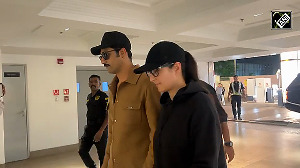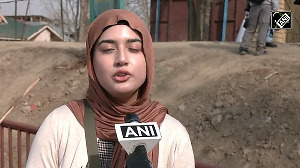Amid growing alarm in the United States over Pakistan's dealings with the Taliban in the restive northwest, Islamabad told Washington on Monday that it will never negotiate with terrorists and insisted it was holding a political dialogue with only those elements who gave up their arms.
"Pakistan is convinced that there is a need to address factors that encourage terrorism.... the government has initiated a political dialogue with elements that have laid down arms and joined mainstream political activity," Prime Minister Yousuf Raza Gilani told visiting US Assistant Secretary of State Richard Boucher during a meeting in Islamabad.
Boucher arrived in Islamabad on Monday morning as Pakistan initiated a major crackdown on militants in the northwestern tribal belt who had extended their activities to the strategic city of Peshawar.
It is the first such offensive by the new civilian government led by Gilani since it launched controversial peace talks with local Taliban militants in March that had raised hackles in the US.
Boucher is understood to have raised with Gilani Islamabad's moves to arrive at peace deals with local Taliban groups.
"We will, however, never negotiate with militants nor allow foreigners to use our soil against another country," Gilani told the American official.
As part of a three-pronged strategy to tackle terrorism, the government is conducting a political dialogue, accelerating economic development and reserving the right to use force if peace agreements are violated, Gilani said.
Boucher said the US has "great interest in the success" of the democratic government and the economic well-being of the people of Pakistan.
Boucher, whose visit also comes in the wake of fresh tensions along the Pakistan-Afghanistan border, said the US "is ready to help resettle Afghan refugees in their country."
In recent days, relations between Pakistan and Afghanistan hit a new low after Afghan President Hamid Karzai threatened to send his troops to target the bases of Pakistani Taliban leaders Baitullah Mehsud and Maulana Fazlullah.
Afghan officials have also blamed Pakistan's Inter-Services Intelligence agency for a recent assassination bid on Karzai's life. Pakistan angrily dismissed the allegations.
"Pakistan is keen to see a stable and strong Afghanistan in its neighbourhood, which is equally good for both Afghanistan and Pakistan. There can be no meaningful progress and development without stability in the region," Gilani said.
Gilani said Pakistan is making "strenuous efforts to strengthen security" along the border with Afghanistan, including the installation of a biometric system at entry points, adding that Pakistan has also offered to fence the border.
"There is a need for better monitoring of the border from the Afghanistan side as our side has 900 checkposts compared to about 100 such posts on the Afghan side, which is inadequate," Gilani said.
Gilani also emphasised the need for early setting up of US-backed Reconstruction Opportunity Zones to stimulate economic activity in the North West Frontier Province and Balochistan.
Gilani also said he is looking forward to meeting US President George Bush in Washington towards the end of July.
Boucher is also expected to meet President Pervez Musharraf and other senior Pakistan officials.
Gilani also said that terrorism is a global phenomenon and a serious threat to humanity, ruining global peace and economic development.
Gilani said it is "often not realised that one incident of terrorism in Pakistan leads to the flight of foreign capital from the country, besides discouraging the flow of foreign investment".
Noting that a terrorist act had claimed the life of former prime minister Benazir Bhutto, Gilani said Pakistan is fighting terrorism and extremism "in its own national interest and not to serve the objectives of another country".
Gilani said normalising law and order and security in the country and reviving the economy are the two top priorities of his government.
Pakistan needs increased economic assistance to stabilise democracy and to fulfil the promise of providing a better life to the people, Gilani added.
Such help is needed "all the more urgently in view of the steep rise in the global prices of oil and food commodities", Gilani pointed out.






 © 2025
© 2025